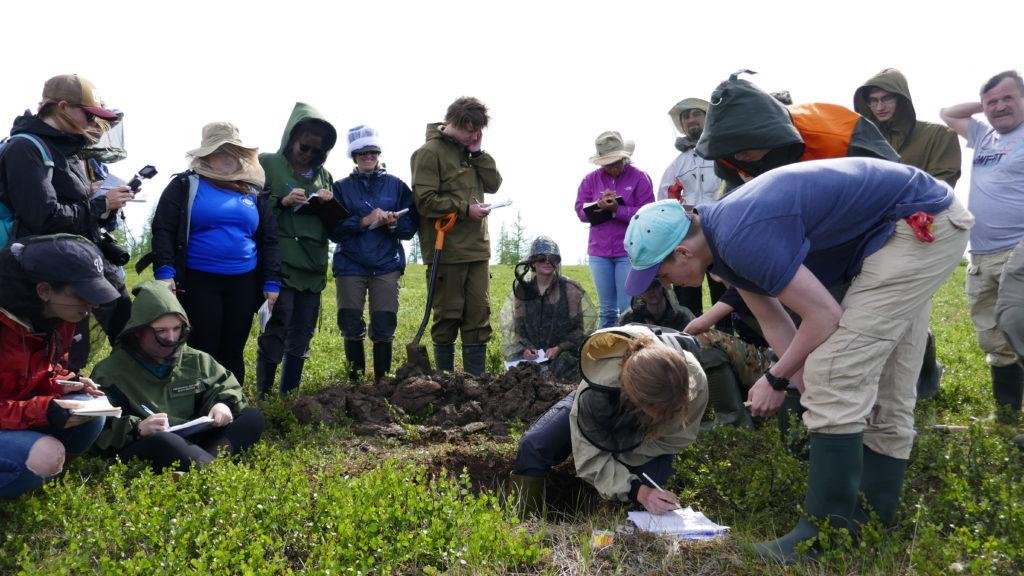Two geography professors took eight students on a trek last summer to a remote region of Russia to study how climate change is disrupting life in the rapidly warming Arctic.
Dmitry Streletskiy, an assistant professor of geography, and Nikolay Shiklomanov, an associate professor of geography and international affairs, led the student team on a trip to two cities in the Siberia region of Russia, working with students at Moscow State University to study changes to permafrost – the layer of always-frozen ground in the tundra – and the impact of the warming climate on the region’s infrastructure.
In Siberia, the group spent a month studying, measuring and characterizing soil, vegetation, permafrost and glaciers to determine how these elements had been affected by changing temperatures. They also worked within the cities Vorkuta and Salekhard, going to museums and talking to city officials about how rising temperatures have disrupted life and impacted future city planning.
“Climate change is definitely happening and it’s happening extremely fast,” Shiklomanov said. “And we can see it and document it if you go to a personal level, especially people living in the city.”
Last summer’s trip was the first time the two professors led a trip to Siberia and the first time the trip focused on urban sustainability in the Arctic. It was funded by a $3 million grant through the National Science Foundation.
Streletskiy said people living near the Arctic Circle feel the impacts of climate change directly because of melting ice caps and thawing permafrost. The Arctic region is warming at about twice the rate of other parts of the world, according to The New York Times.
“When people think about the Arctic, they think about the polar bears and ice, when in fact there are a lot of people living there and they’re at the front of those climate changes,” he said.
The students chosen to participate in the research were from a variety of disciplines, but most were members of Shiklomanov’s Arctic systems class.
Nina Feldman, a first-year graduate student of geography, was one of the eight students who made the trip after working with Streletskiy as a research assistant. She said Streletskiy asked if she would want to join the research team based on her interest in the region.
Feldman said the trip opened her eyes to the way that climate change was affecting different communities and made the changes in the environment appear more important to address.
“I really wanted a sense of what geography and environmental studies was going to be like in that field,” Feldman said. “Getting that side of it definitely made what we did a lot more important and impactful because people need someone to do this and there are people out there who need help.”
In the afternoons, students spent time recording and analyzing data. In the evenings, the group spent two hours in lectures, learning about the environment from students and faculty. The group also met with administrators at museums to learn more about how the thawing permafrost is leading to crumbling infrastructure and damaged buildings.
“I definitely got a first-hand experience as to how climate change is affecting people now and really harshly,” Feldman said. “The people who are in these cities say that their buildings are falling apart because the permafrost is thawing underneath it and it’s just risky formations.”
The two cities sit on the Arctic Circle and take nearly 11 hours to travel between. Salekhard is an oil and gas hub, with an increasing population because the thawing of permafrost is opening up new sectors of the economy. In contrast, Vorkuta, a former mining town, has a dwindling population near 60,000 because its mining industry is struggling, Streletskiy said.
The professors said next summer they plan to take students on another trip to Alaska, bringing students from GW as well as Moscow State University and other universities in Europe and South America to study climate change in locations like Anchorage or Fairbanks.
“We cannot force people to come, but I hope that some of those students who came with us to Siberia will be interested enough to stick with us,’” Shiklomanov said about the next group of travelers.
Caitlyn Phung contributed to reporting





